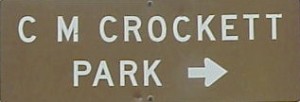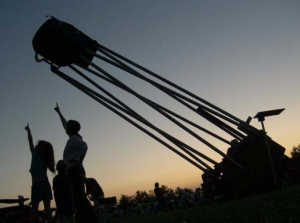This shower runs annually from October 2 to November 7. It peaks this year on the night of October 21 and the morning of October 22. The Orionids are meteors left behind in the wake of Halley’s Comet. The nearly full moon will block some of the fainter meteors this year, but the Orionids tend to be fairly bright so it could still be a good show. Best viewing will be from a dark location after midnight. Meteors will radiate from the constellation Orion, but can appear anywhere in the sky.
Keep your fingers crossed! Every now and then the Taurid meteor shower — normally modest — produces spectacular fireballs visible even in bright moonlight. Most recently this happened in 2008. Since the meteor stream is rather spread out in space, Earth takes several weeks to pass through it, causing an extended period of meteor activity, compared with the much smaller periods of activity in other showers. The Taurids are also made up of weightier material, pebbles instead of dust grains. The thin crescent moon will set early in the evening leaving dark skies for viewing. Best viewing will be just after midnight from a dark location far away from city lights. Meteors will radiate from the constellation Taurus, but can appear anywhere in the sky.
The Leonids is an average shower, producing up to 15 meteors per hour at its peak. This shower is unique in that it has a cyclonic peak about every 33 years where hundreds of meteors per hour can be seen. That last of these occurred in 2001. The Leonids is produced by dust grains left behind by comet Tempel-Tuttle, which was discovered in 1865. The shower runs annually from November 6-30. It peaks this year on the night of the 17th and morning of the 18th. The waxing gibbous moon will set shortly after midnight leaving fairly dark skies for what could be a good early morning show. Best viewing will be from a dark location after midnight. Meteors will radiate from the constellation Leo, but can appear anywhere in the sky

All of the weather forecasts agree that cloud cover will increase after 15:00 to ‘mostly cloudy’ (or worse). Transparency “too cloudy to forecast” and seeing poor to impossible won’t allow us to show the public wonders of the night sky.
Hoping for better conditions in 2019,
R J ‘Tree’ Greenwood
Crockett Park Site Coordinator
Please read the C.M. Crockett Page for park details.
Planning on staying up late (or waking up early) for this one. The Geminids is the “king” of the meteor showers. It is considered by many to be the best shower in the heavens, producing up to 120 multicolored meteors per hour at its peak. It is produced by debris left behind by an asteroid known as 3200 Phaethon, which was discovered in 1982. The shower runs annually from December 7-17. It peaks this year on the night of the 13th and morning of the 14th. The first quarter moon will set shortly after midnight leaving dark skies for what should be an excellent early morning show. Best viewing will be from a dark location after midnight. Meteors will radiate from the constellation Gemini, but can appear anywhere in the sky
The Ursids is a minor meteor shower producing about 5-10 meteors per hour. It is produced by dust grains left behind by comet Tuttle, which was first discovered in 1790. The shower runs annually from December 17-25. It peaks this year on the the night of the 21st and morning of the 22nd. This year the glare from the full moon will hide all but the brightest meteors. If you are extremely patient, you might still be able to catch a few good ones. Best viewing will be just after midnight from a dark location far away from city lights. Meteors will radiate from the constellation Ursa Minor, but can appear anywhere in the sky.

Although the Clear Sky Chart shows only 20 to 40% cloud cover[1], the ClearOutside site predicts over 80% of the sky obscured by clouds.[2] WeatherUnderground says 39 to 70%[3] and AccuWeather says ~90% cloud cover.[4] Other paid weather-guessers predict partly or mostly cloudy and most give a five to fifteen percent chance of measurable precipitation. Not conditions suitable for star gazing.
Clear skies, dang it! Please?
Tree Greenwood
Crockett Park Site Coordinator
1 – http://www.cleardarksky.com/c/CrckttPrkVAkey.html
2 – https://clearoutside.com/forecast/38.60/-77.73?view=midday
3 – https://www.wunderground.com/hourly/us/va/midland/date/2019-04-06/22728
4 – https://www.accuweather.com/en/us/midland-va/22728/hourly-weather-forecast/2111280?hour=40
Please read the C.M. Crockett Page for park details.


